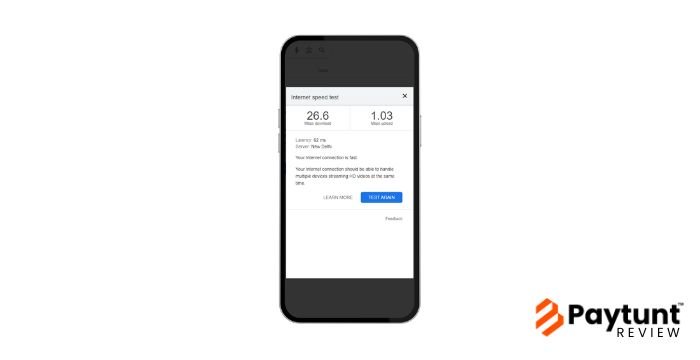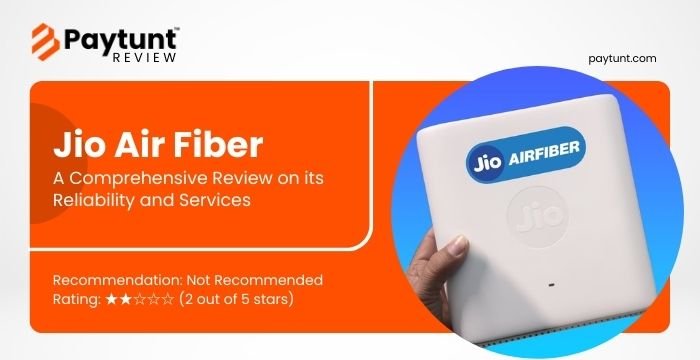Recommendation: Not Recommended
Rating: ★★☆☆☆ (2 out of 5 stars)
Reliability and transparency are two critical aspects that should feature prominently when choosing an internet service. Following an evaluation by the PRS Paytunt Review System, we take a deep dive into Jio Air Fiber, which has sparked concerns from users. This review explores why Jio Air Fiber may not be a suitable option for a reliable internet connection.
Power Consumption Concerns
One of the first concerns to note about Jio Air Fiber is its power consumption. The device comes equipped with a Power over Ethernet (PoE) setup, which, while convenient for some users, results in higher electricity usage. This can be a significant issue, particularly for users residing in areas where electricity consumption is already high, or where frequent power cuts and voltage dips are a common occurrence.
If you are in such an area where electricity supply is unreliable or you want to minimize energy costs, the Jio Air Fiber setup may not be the most practical option for you. Its energy demands could outweigh any potential benefits, making it less efficient compared to other internet services.
Data Capping: The Hidden Condition
Another major issue with Jio Air Fiber is the hidden data capping that users are not informed about at the time of purchase. According to reports, the company imposes a data cap on users without clear communication, which is frustrating for customers who expect transparency.
Data capping can drastically hinder the user experience, especially for households or businesses that require high internet usage. Whether it’s for streaming, gaming, or working from home, these hidden usage limits mean that your connection speed will slow significantly once a certain threshold is crossed. This lack of transparency makes Jio Air Fiber less competitive compared to regular Jio Fiber services or other alternative internet providers on the market.
Jio Air Fiber vs. Jio Fiber: A Comparison
Jio Air Fiber services struggle to match the quality of regular Jio Fiber connections. Jio Fiber, which relies on physical copper cables, provides more stable connections and higher data transfer rates. Jio Air Fiber, on the other hand, often falls short in terms of speed and reliability.
For example, if you opt for a 30 Mbps plan with Jio Fiber, your actual download speed would be calculated as 30 Mbps divided by 8, resulting in 3.75 MBps. This is sufficient for basic internet usage. However, with Jio Air Fiber, users often report that speed tests show a download speed of around 24 Mbps, while upload speeds drop significantly to around 4 Mbps. This inconsistency in speed is a serious issue for users who require fast, reliable internet for tasks such as video conferencing, large file transfers, or online gaming.
Poor Data Transfer Rates
Perhaps the most disappointing aspect of Jio Air Fiber is its slow data transfer rates. While speed tests may show a decent download speed, the actual user experience tends to fall short of expectations. Slow data transfer rates lead to buffering during video streaming, lag in online gaming, and delays when downloading large files.
For users who rely on a steady and fast internet connection for work or entertainment, these issues can be a major drawback. The inconsistency between download and upload speeds further complicates the experience, making Jio Air Fiber less appealing for those who need to perform data-heavy tasks such as video calls, HD streaming, or large-scale file transfers.
Why You Should Consider Jio Fiber or Other Alternatives
Given the numerous drawbacks of Jio Air Fiber, it’s no surprise that the PRS Paytunt Review System does not recommend this service. High electricity consumption, hidden data caps, and poor data transfer rates make Jio Air Fiber a less desirable option compared to regular Jio Fiber or other wireless internet service providers.
If you’re searching for a reliable internet connection, it would be wise to consider alternatives. Regular Jio Fiber offers more stable connections without hidden data caps, ensuring that you get the speed and performance you’re paying for. Other operators also provide wireless internet services with better transparency and faster data speeds, making them a more worthwhile investment.
Conclusion
In summary, while Jio Air Fiber may seem like a convenient option for wireless internet access, its disadvantages far outweigh the benefits. The high power consumption, hidden data caps, and inconsistent speeds make it difficult to recommend this service. For those seeking reliable internet services, it’s better to opt for Jio’s regular fiber connection or explore alternative wireless providers.
Your internet connection plays an important role in your daily life, and it’s crucial to choose a service that meets your expectations and provides value for the money you invest. If you’re still considering Jio Air Fiber, it’s essential to weigh these factors carefully before making your decision.


